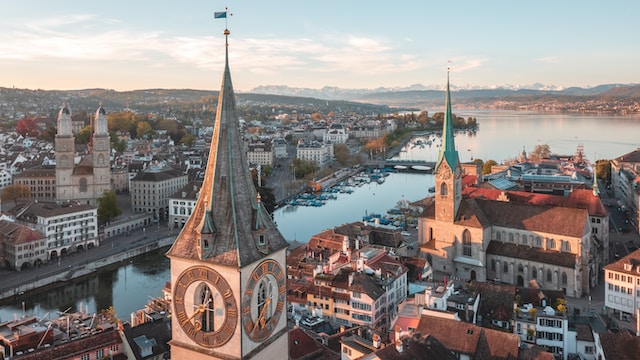
Photo: Henrique Ferreira on Unsplash
Why Zurich comes top in the latest smart city ranking
04 April 2023
by Sarah Wray
Zurich, Switzerland takes the lead in the latest Smart City Index from IMD business school, followed by Oslo and Canberra.
The Index is produced by The Smart City Observatory, which is part of the IMD World Competitiveness Center. It combines data and resident survey responses to show the extent to which technology is being used by cities to address challenges and improve quality of life.
Across 141 cities, a total of 20,000 people were surveyed about 15 aspects of living in their cities and what issues they believe are most urgent, as well as about their feelings on technology-related issues such as use of personal data and facial recognition.
This year’s Index includes city-level data from the Global Data Lab’s Human Development Index (HDI), which measures life expectancy, expected years of schooling and the mean years of education completed, as well as the per capita income of a city’s citizens. Previously, country-level data was used.
Lessons from Zurich
Life expectancy in Zurich is 84, and residents rate affordable housing, road congestion, unemployment and air quality as their main priorities.
Eighty percent say public transport is satisfactory and 71 percent think it’s easy to find information about local government decisions.

Bruno Lanvin, President of the Smart City Observatory, told Cities Today that survey samples in each city are representative.
He said factors driving Zurich’s leading position include that it has demonstrated the ability to be both a worldwide hub and “a liveable city with strong human-centric policies”.
“Clearly, Zurich benefits from the fact that it is a Swiss city, and thus benefits from all the positive image branding attached to its home country in areas like governance, safety and quality of life,” he said. “But Zurich also stands out by being a global transport hub, highly connected through Kloten airport, and reliable railways and roads.
“The high-level combination that the city offers in terms of job opportunities – both in long established sectors such as finance, but also on the scene of innovation – makes it a global talent magnet. Zurich’s geographical situation and mild weather also make it a place of rare landscape beauty and quality of life.”
Despite some of Zurich’s unique attributes, Lanvin believes other cities can draw lessons, including the importance of fostering links between high-level universities and industry as a tool to drive innovation and attract investment from leading global firms.
“Giving priority to inclusion and diversity helps make a city more dynamic and open to the world, while making local life more vibrant for citizens and enterprises,” he said.
Lanvin added that leveraging the history and culture of a city is often an efficient way to create a sense of local ‘uniqueness’, and to make a smart city strategy more sustainable in the face of future changes.
Super cities
Asian and European cities dominate this year’s top 20. Among them, IMD names six “super champions” because they have been continuously improving their performance since 2019: Zurich, Oslo, Singapore, Beijing, Seoul and Hong Kong.
Lanvin said sustainability is also gaining importance as a lynchpin of smart city success. He said this is evident in Zurich as well as ‘second-tier’ cities such as Montreal and Bilbao.
“This goes beyond plans to optimise energy usage or to encourage clean mobility solutions. A number of cities around the world are now pursuing selective strategies to attract talent and investments through net zero enterprises.”
He added: “When we started this index, we had the working hypothesis that sustainable smart cities would be the ones focusing on people as opposed to technology. And we’ve been happy to see over the last five years that this is becoming a central principle.”
The push for this is coming from residents as well as city leaders, he noted.
“So we are getting a sobering view about what technology can do and cannot do. It is clearly at the core of what smart cities are about, but not the objective.”
A spokesperson for the mayor’s department in the City of Zurich told Cities Today by email: “We are delighted to have been named first in IMD’s Smart City Index and that the city administration’s drive for an open, collaborative and inclusive city that focuses on its inhabitants’ needs is being recognised.
“As the index report mentions, the general understanding of a ‘smart city’ has undergone changes in recent years, moving from a purely technology-focused definition to one where citizen-centricity, sustainability and inclusion play a much larger role. Our understanding of smart, as laid out in our smart city strategy, has always been one that focuses on people, connecting them amongst themselves and with the city administration with the help of technology to bring about positive outcomes. We therefore welcome this move towards a more human-focused city.”
The spokesperson added: “The index respondents’ priorities align very well with our 2035 strategy as well as our corresponding specialist strategies. With our net zero emissions goal, we are working to become climate neutral by 2040 and even sooner (2035) within the city administration itself.
“Our affordable housing goal means that by 2050, we want at least one third of Zurich’s rental market to be non-profit. And with our City Traffic 2025 strategy, we are prioritising public transport, cycling and walking over motorised private transport. This alignment shows us that we are working on the topics that matter to people in Zurich and that the respondents are content with the progress we are making.”
Surveillance
The survey asked residents about technology topics such as cashless payments and whether they would share personal data to reduce congestion. Facial recognition was included because it is a controversial technology, Lanvin said.
“There are many ways smart cities can get a bad name and surveillance is one of them,” he commented.
Facial recognition has been banned in some places, and typically sparks debates about accuracy, potential bias and civil liberties.
Lanvin said that feelings about technology are linked to local culture and vary even within countries.
“Basically, the debate is very much the same as the one you have about artificial intelligence or other similar advanced technologies,” Lanvin said. “That is, people realise the potential of these tools vis-a-vis certain problems that exist in cities, like safety. But that does not diminish the fears or concerns about some kind of uses that could be made of the same technology to limit personal freedoms.”
In Zurich, 60 percent of respondents said that they would be comfortable with the use of facial recognition technologies to lower crime, 66 percent said this in Oslo and 68 percent in Canberra.
Updated April 5, 2023 to incorporate comments from the City of Zurich.






